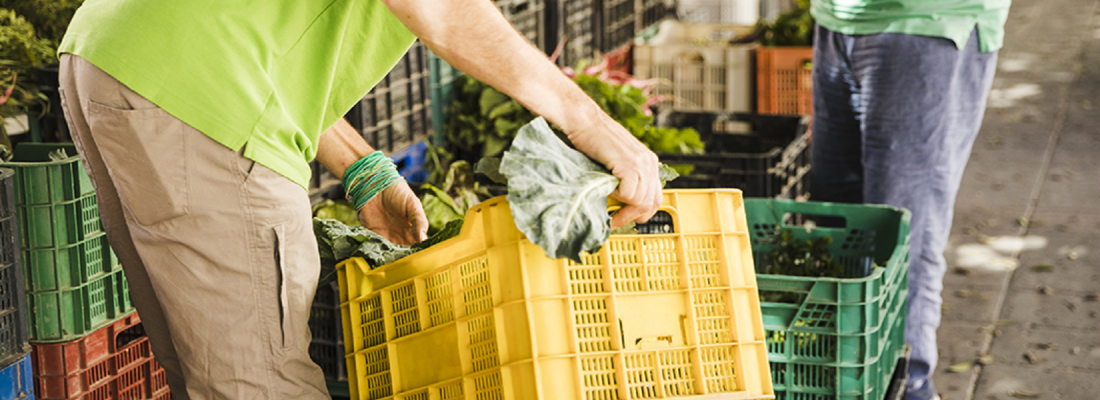Society and regional strategies Reading time 4 min
COVID-19: are short food-supply chains more resilient in times of crisis?
Published on 10 April 2020

To better understand what food producers, food distributors and consumers are currently experiencing, a working group in the Local Food RMT (an umbrella organisation for thematic research under the aegis of the French Ministry for Food and Agriculture), composed of Yuna Chiffoleau (INRAE), Catherine Darrot (Institut Agro/CNRS) and Gilles Maréchal (Terralim), is coordinating a survey to gather information and share the findings via a fortnightly newsletter (in French). Yuna Chiffoleau, research director for economic sociology at INRAE, speaks about the team’s findings.
Why was INRAE already interested in this topic? What role did the Local Food RMT play?
How resilient are local food supply chains?
Yuna Chiffoleau: In 2017, the Scientific Directorate for Food at INRAE asked our team in the Joint Research Unit for Innovation to study the question of resilience in food supply chains. How might a city’s food supply networks be disrupted in a time of crisis, and what conditions are needed for those networks be able to continue to supply the city? The initial driver for research in this area was the vulnerability of Paris’ primary wholesale market at Rungis. The market is omnipresent in supply chains for the whole of France, yet only has a few days’ worth of supplies at any time. What would happen in case of a blockade, a fire or a flood at the market? The question was also raised about how cities are dependent on different suppliers, countries or regions in matter of food. Food flows is a subject we know very little about, actually. We decided to look at food supply chains at city-level, using Montpellier as a case study, given that our research unit is based there. We studied whether the complementary relationship between long and short food supply chains makes resilience in the food supply chain possible. We were in the process of testing the possible effects of a crisis, such as one caused by climate change or by a blockade like we saw with the yellow vests movement that shut down many major roadways. But we never imagined that, in a very short amount of time, we would be dealing with an actual global pandemic! We shared our initial findings with the Local Food RMT, which made resilience in local food supply chains one of their research focuses. The silver lining is that the crisis brings more clarity to our research questions. In the face of the crisis, the strengths and weaknesses of long and short supply chains rapidly become apparent. Understandably, producers, distributors and consumers spoke of the difficulties they’ve faced during the crisis, but also how they have adapted and found creative responses to manage.
How did the idea for a newsletter come about?
Terralim, a research and development cooperative based near Rennes, launched a form to gather feedback on people’s experiences (in French). The form is accessible to all, and was initially used to gather data on experiences in France. The idea of sharing real-time information on how the pandemic was impacting food systems led to the creation of a small work group that brought together Terralim, Institut Agro and the regional association of agricultural and rural development centres (CIVAM) of Brittany, which hosts the Local Food RMT. The initiative was perfectly in line with the work of the Local Food RMT, which I am the co-chair. Catherine Darrot, from Institut Agro/CNRS, Gilles Maréchal, from Terralim, and myself work together to compile the information collected on people’s experiences. Most of the experiences deal with short food supply chains, although we’re also hearing about what is happening in long supply chains, in people’s kitchens and in food assistance programmes. Another member of the Local Food RMT, Greniers d’abondance, had recently published a guide on resilience in food systems with a contribution from INRAE. It also joined the work group. The feedback form has been translated and used in Italy, Poland, Spain, Portugal, Argentina and Brazil, and has just been translated into English too. We would like to collect as much feedback as possible on people’s experiences around the world. Our international colleagues are collecting and compiling the information. In Italy, for example, a network of urban food policy experts is working on it together with the FAO’s Food for the Cities programme. In Argentina, it’s a group of sociologists collecting and compiling the feedback. Once this pandemic has passed, all the different groups and organisations hope to come together to explore the similarities and differences among experiences in these countries.
What are the aims of this project
Food producers, distributors and consumers need to feel that they’ve been heard
Our aim is to compile the experiences of food producers, distributors and consumers, and to understand what they’ve experienced, what they’ve observed and how they adapted over the course of the crisis. The idea is also to cross-check between what is said and announced officially on one hand, and the actual situation on the ground on the other. For example, French Minister of the Economy and Finance Bruno Le Maire encouraged major retailers to buy agricultural produce from France; does any of the feedback corroborate that happening? We’re also investigating areas that may be overlooked by the media and see if we can detect any nascent trends. The idea is to be as close to the source of the data as possible, and to take a participatory approach to science — something INRAE places much value on. For the first newsletter, feedback from over 130 sources was compiled and analysed. Now, there are data from more than 300 sources. We compile everything — being mindful to avoid ideology or value judgements — using qualitative analysis methods drawn from sociology. Once we’ve received and read the feedback, it is used directly to feed the newsletter. The feedback isn’t edited. This puts the emphasis on what people have said; food producers, distributors and consumers need to feel that they’ve been heard. We also use lexicometric techniques to enrich the qualitative analysis.
What did you discover?
Open source digital associations played an important role in securing resilience in short supply chains
The first week of stay-at-home orders in France saw a run on dry goods in supermarkets, but not on produce. A significant amount of produce sales moved over to short supply chains, and to neighbourhood markets in particular. Producers felt some panic when the possibility of closing neighbourhood markets was being discussed — something that eventually did happen at the start of the second week of lockdown. Producers were nevertheless able to quickly find alternative arrangements, whether by offering delivery or by working with other producers to share resources, for example. Producers who had the ability to contact their clients have done quite well, actually. With the help of digital associations, producers also created a number of new initiatives, such as online sales sites and cooperative sales networks. Open source digital associations really played a vital role securing resilience in short supply chains. The rapid development of new distribution channels helped to ease some consumer fears. Municipal and local authorities also played an important role by posting about local producers, suppliers and neighbourhood shops. At the end of the first week of confinement, feedback showed that supermarkets weren’t the only ones weathering the pandemic well; local supply chains are thriving too.
What’s next for the newsletter?
The newsletter will continue to be a source of advice, best practices and innovation put together by its contributors. It will also identify potential points of friction to better avoid difficulties once we come out of confinement. For example, there was a run on many short supply chains when stay-at-home orders were introduced. Producers have underscored the fact that time is also needed to produce, the focus cannot be on selling alone, otherwise there will be nothing left to sell come summertime. While it’s been necessary in certain cases to set purchase limits, it’s also important to reassure consumers that producers will still be around down the line. Once stay-at-home orders are lifted, all the information we’ve gathered will be used by researchers to further their investigations on this issue and to inform public policymakers on how to build resilience in our food systems.
Thank you, Yuna!
Since it was established in 2015, the Local Food RMT’s work has focused on capacity-building in the field of food sustainability. “The RMT has just received funding for another five years. It’s hosted by the regional association of agricultural and rural development centres (CIVAM) of Brittany and is jointly managed with INRAE,” says Yuna Chiffoleau. Almost 40 organisations operate under the aegis of the network. There are a dozen higher research and education institutions participating, such as INRAE, CNRS, higher education centres and vocational schools, as well as almost 20 organisations from the fields of agricultural or rural development, such the network of French chambers of agriculture. The Local Food RMT produces reports, supports intersectional research and innovation projects among participants, develops resources and offers training. It also develops public policy proposals in relevant sectors.
Local food RMT website (in French)
What is an RMT?
An RMT (from the French acronym for “joint technology network”) is an umbrella organisation working in the field of agriculture and food. RMTs bid for funding from the French Ministry for Agriculture and Food. There are over 20 Joint Technology Networks, and they bring together scientists, agricultural developers and trainers, particularly from the field of agricultural education. Their mission is to produce collective expert reports on a broad scope of topics, ranging from sustainable packaging and agricultural labour to local food.
Link
Yuna Chiffoleau, the long and short of short distribution channelsYuna Chiffoleau is a research director in sociology in the Science for Action and Development Division of INRAE (formerly INRA). Specialising in economic sociology and networks, she is particularly interested in short food distribution channels, and committed to measuring their impact on growers and consumers.
